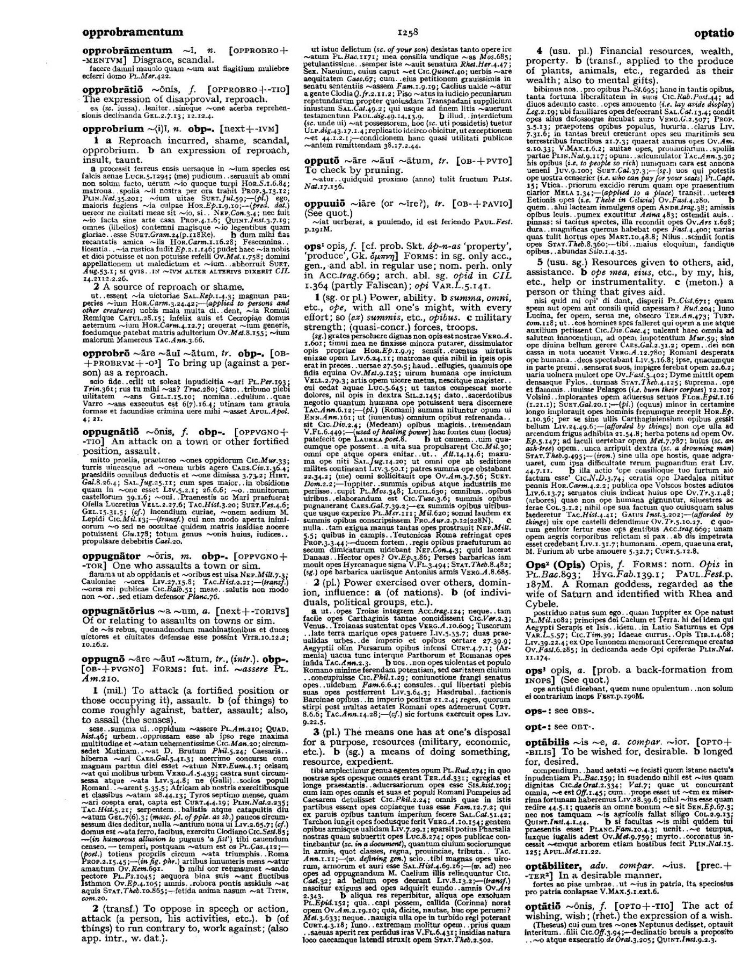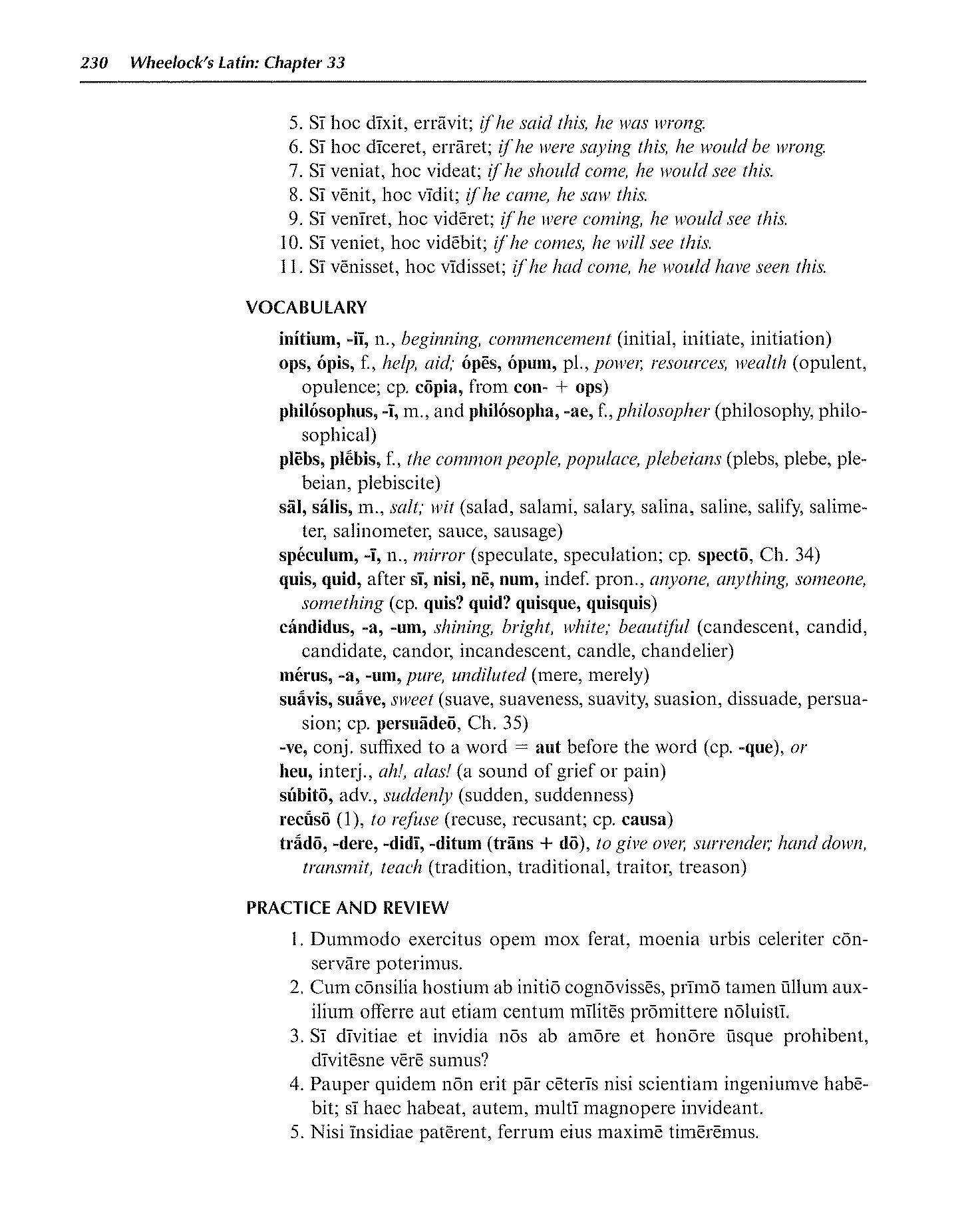
page_listing.tpl
page_subListingDetails.tpl
sub_listingDetails_style1.tpl
sub_listingDetails.title.tpl
ops resources
ops is a Latin Noun that primarily means resources.
Definitions for ops
Wheelock's Latin
Noun
- 1
help, aid; opēs, opum pl., power, resources, wealth
English derivatives:
opulent opulence
Oxford Latin Dictionary
Noun
- 1
(sg. or pl.) Power, ability. (b) summa, omni, etc., ope, with all one's might, with every effort; so (ex) summis, etc., opibus. (c) military strength; (quasi-concr.) forces, troops.
- 2
(pl.) Power exercised over others, dominion, influence: (a) (of nations). (b) (of individuals, political groups, etc.).
- 3
(pl.) The means one has at one's disposal for a purpose, resources (military, economic, etc.). (b) (sg.) a means of doing something, resource, expedient.
Sentences with ops
Latin to English
Pecūnia ipsa nōn est mala: sed rēs mentis animīque plūs opis ad fēliciter vīvendum offerunt.Compare Money itself is not bad; but the things of the mind and the soul offer more help for living happily.
Regem non faciunt opes, non vestis Tyriae color, non frontis nota regiae, non auro nitidae fores; rex est qui posuit metus et diri mala pectoris.Compare A king neither riches make, nor robe of Tyrian hue, nor crown upon the royal brow, nor doors with gold bright gleaming; a king is he who has laid fear aside and the base longing of an evil heart.
Hic est ille situs cui nemo civis neque hostis quibit pro factis reddere opis pretium.Compare Here lies a man whom neither fellow citizen nor foe can ever properly repay for his exploits.
Aude, hospes, contemnere opes et te quoque dignum finge deo, rebusque veni non asper egenis.Compare Have the courage, my guest, to despise possessions; train yourself, as he, to be worthy of godhead: don't be intolerant of poverty.
Magnas inter opes inops.Compare A pauper in the midst of wealth.
Declension table for ops
Cactus2000
| Singular | Plural | |
| Nom. | ops | opēs |
| Gen. | opis | opum |
| Dat. | opī | opibus |
| Acc. | opem | opēs |
| Abl. | ope | opibus |
Data sources
Notes
- Definitions
- Frederick M. Wheelock, Wheelock's Latin, 6th ed., rev. Richard A. LaFleur (New York, NY: HarperCollins Publishers, 2005): 230.
- P. G. W. Glare, Oxford Latin Dictionary, Vols. 1-8 (Oxford: Clarendon Press, 1982): 1258.
- Word frequencies
- Christopher Francese, "Latin Core Vocabulary," Dickinson College Commentaries, last modified 2014, http://dcc.dickinson.edu.
- Paul B. Diederich, The Frequency of Latin Words and Their Endings, PhD diss., (Columbia University, 1939).
- Louis Delatte, Suzanne Govaerts, Joseph Denooz, and Etienne Evrard, Dictionnaire fréquentiel et index inverse de la langue latine [Frequency Dictionary and Inverse Index of the Latin Language] (Liège, Belgium: Laboratoire d'analyse statistique des langues anciennes de l'Université de Liège [L.A.S.L.A.], 1981): 121.
Bibliography
Allen, Joseph H. Allen and Greenough's New Latin Grammar for Schools and Colleges: Founded on Comparative Grammar. Edited by James B. Greenough, George L. Kittredge, Albert A. Howard, and Benjamin L. D'Ooge. Boston, MA: Ginn & Company, 1903.
Crystal, David. A Dictionary of Linguistics and Phonetics. 6th ed. Oxford, UK: Blackwell Publishing, 2008.
Delatte, Louis, Suzanne Govaerts, Joseph Denooz, and Etienne Evrard. Dictionnaire fréquentiel et index inverse de la langue latine [Frequency Dictionary and Inverse Index of the Latin Language]. Liège, Belgium: Laboratoire d'analyse statistique des langues anciennes de l'Université de Liège (L.A.S.L.A.), 1981.
Diederich, Paul B. The Frequency of Latin Words and Their Endings. PhD diss., Columbia University, 1939.
Francese, Christopher. "Latin Core Vocabulary." Dickinson College Commentaries. Last modified 2014. http://dcc.dickinson.edu/latin-vocabulary-list.
Gildersleeve, Basil L., and Gonzales Lodge. Gildersleeve's Latin Grammar: Third Edition, Revised, and Enlarged. 3rd ed. London, England: Macmillan and Co., 1903.
Glare, Peter G.W. Oxford Latin Dictionary. Vols. 1-8. Oxford, England: Clarendon Press, 1982.
Krüger, Bernd. "Latin Conjugation Tables." Cactus2000. Accessed May 5, 2023. https://latin.cactus2000.de/index.en.php.
Pierson, Nick. "Sound of Text." Accessed October 26, 2019. https://soundoftext.com.
Wheelock, Frederick M. Wheelock's Latin. 6th ed. Revised by Richard A. LaFleur. New York, NY: HarperCollins Publishers, 2005.
Wiktionary Contributors. "Victionarium." Wikimedia Foundation, Inc. Updated March 18, 2019. https://la.wiktionary.org/wiki/Victionarium:Pagina_prima.
Citation
Chicago (17th ed.)
Allo Contributors. "ops, opis (n.) - Latin Word Definition." Allo Latin Dictionary. Last modified . Accessed February 20, 2026. http://ancientlanguages.org/latin/dictionary/ops-opis.
Entry created on . Last updated on .







